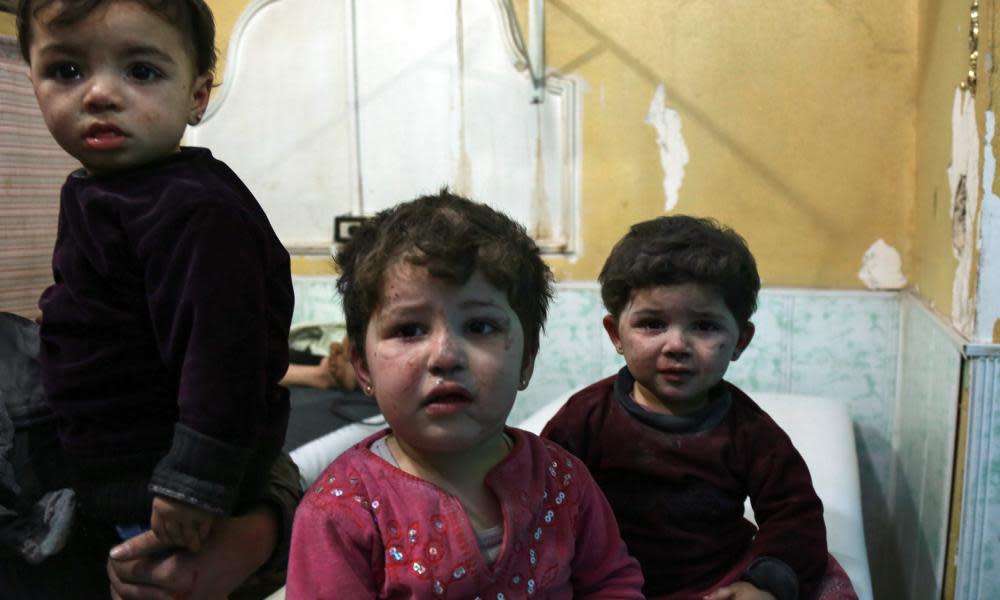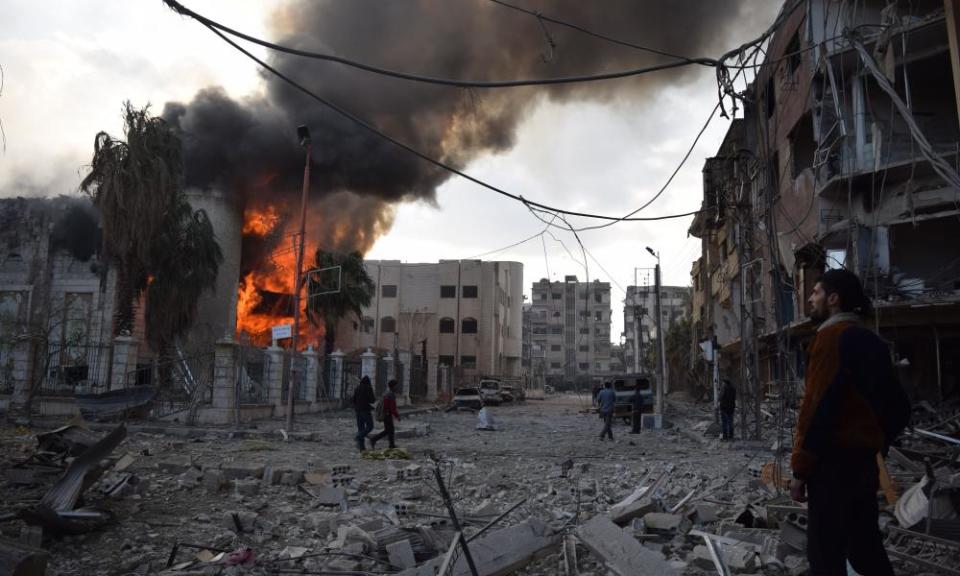Moscow mired in Syria as Putin’s gameplan risks a deadly ending

From his spot in the ruins of east Ghouta, Arif Othman sees the current phase of Syria’s war as brutally simple. The longer he holds out against Bashar al-Assad and his allies, the worse it will get – especially at the hands of the Russians.
“We were supposed to have surrendered by now,” he said at the end of the most intensive week-long barrage anywhere in Syria in the past three years.
“When we didn’t, the bombs were bigger, the planes more regular, and the injuries like nothing we’ve seen. All sent from Moscow.”
The Russian-led air blitz has been the sum of all fears for the besieged population on the ground. Up to 400,000 people, with nowhere to run, have been pinned down by Vladimir Putin’s air force as Syrian and Iranian-backed ground troops edge closer to the largest and most important opposition area anywhere south of Idlib.
For Assad and Putin, Ghouta is the key to controlling the capital, and winning the war. But outside the Syrian cauldron, friends and foes alike are starting to believe both men have miscalculated.
It is increasingly unclear how Moscow will recoup its investment in the world’s most complex conflict
Nearly 18 months into Russia’s intervention to prevent Assad’s defeat at the hands of rebel groups that were advancing on his heartland areas of Latakia and Tartous, it is increasingly unclear just how Moscow will recoup its investment in the world’s most complex and intractable conflict.
While it no longer appears Assad is in danger of falling, what remains of Syria looks nothing like the prewar country he used to rule. Central authority in the once-rigid police state has been subsumed several times over – first by opposition groups, and then by regional players also increasingly invested in shaping postwar outcomes in their own interests, which only partly align with what Putin wants. Protagonists on both sides are drowning in a swamp they did not see ahead.
Putin, in particular, is learning that Syria in its present form is ungovernable. His December claim of “victory” at a Russian airbase near Idlib has been followed by a dizzying series of events which, on the contrary, have drawn Russia further into the war. At the same time they have exposed the Assad regime’s near-total dependence on proxy support to hold its positions, let alone secure more gains.
The statement is looking every bit as premature as George W Bush’s claim of “mission accomplished”, made in a speech on the flight deck of the USS Abraham Lincoln in 2003 at the end of the war in Iraq. In attempting to showcase a superpower’s military strength, the former president instead exposed its diplomatic limitations.

Across Syria, and in the region itself, alliances that were more or less predictable are now splintered and opaque. A chessboard once easy to read could now outwit a grandmaster of global geopolitics.
From Ghouta north to the Turkish border, from Hama in the west to the oil-rich Deir ez-Zor in eastern Syria, where up to 200 advancing Russian mercenaries were killed by a US counterattack on 7 February, a new regional order is being fought out.
“And we will be trampled like mice under the feet of buffaloes,” said Ayman Thaer, a volunteer at an aid centre in Ghouta, where at least 500 people were killed this past week by Russian and Syrian bombs. “May God damn them all.”
Just how to balance the increasingly potent interests on display in Syria is bedevilling all who have tried.
“The only winner so far is Iran,” said Bassam Barabandi, a former Syrian diplomat who defected from the regime in mid-2013. “It achieves what it wants without too much noise. Iran enjoys Russian-American conflict because it makes Russia more dependent on Iran to survive.”
The clash between the US and Russian mercenaries sent to Syria was kept quiet by Moscow, which – in different circumstances – would have complained bitterly if 200 of its citizens had been killed by a rival power. For Putin to admit even that the men were there would have belied his claim of victory and withdrawal from a war that no longer needed him. Acknowledging they were advancing on an oil refinery held by US Kurdish proxies would have been an equally tough sell, at a time when securing Syria from the threat of terrorism and US hegemony remains the official narrative.
US intelligence officials believe the company that recruited the Russians – the Wagner Group – is controlled by a Putin confidant, Yevgeniy Prigozhin.
Also staking its claim in Deir ez-Zor is Iran, with which Russia has partnered to ensure that what remains of the anti-Assad opposition can no longer win the war. Russian officials have complained to counterparts in Turkey that Iranian aims are increasingly at odds with their own.
A senior Turkish diplomat told the Observer Moscow feels especially threatened by what it sees as Iran’s determination to build a state security structure in Damascus modelled on its Revolutionary Guard Corps – the most powerful institution in Tehran 40 years after the Islamic Revolution. “But how can they stop them?”, the diplomat said. “Putin won’t have it his own way from here. And we can see [the Russians] getting irritated by it.”
From mid-2016, Putin started to draw Turkey’s Recep Tayyip Erdoğan into an alliance with Iran which aimed to bring the war to an end on terms to Assad’s benefit.
The alliance was a death knell for an opposition that Turkey backed in the north. It culminated in a trilateral summit in Sochi last November, which was supposed to deliver a diplomatic victory that had eluded all others – and at the same time sideline a moribund UN-backed process. It was an embarrassing failure. Diplomacy has since collapsed and violence, first in Idlib and now in Ghouta, is nearing record levels.
Turkey has reframed its involvement in the war, started to oust Assad but now aimed at keeping Kurds from controlling the Turkey-Syria border. Last month Turkey sent troops – and Arab militia – into the Syrian border enclave of Afrin to fight Kurdish militias. The move was quietly sanctioned by Moscow. But in the past week, forces loyal to Assad were allowed into Afrin to counter the Turks. Russia’s position on this development is unclear. “Russia always says it does not have the leverage on Assad the way the world thinks. This is true,” said Barabandi. “Iran has more influence on Assad. Put simply, Iran came to stay in all of Syria and to challenge the US by threatening Israel. Syria will be the theatre in any coming war between Hezbollah and Iran against Israel. At least this is what the Iranians are hoping.
“And Iran is happy that Russia has taken the lead in Syria and let them empower their forces without distraction. None of the players trust each other and what we see is short-term contracts that may shift at any time. The only thing they have in common is they want the US to be out of Syria.”
Meanwhile, Russia – which had high hopes that Syria would be a launching pad for a new power projection, ensuring Assad’s survival and securing its own lead role in shaping order in the region, and perhaps far beyond – is focusing on more short-term gains. “As we helped the brotherly Syrian people, we tested over 200 new types of weapons,” said Vladimir Shamanov, head of the Russian Duma’s defence committee. “Today our military-industrial complex made our army look in a way we can be proud of.”
With little to bank, Russia will continue to find its veto at the UN Security Council a potent tool. It has vetoed UN resolutions against Assad 11 times.

 Yahoo News
Yahoo News 
